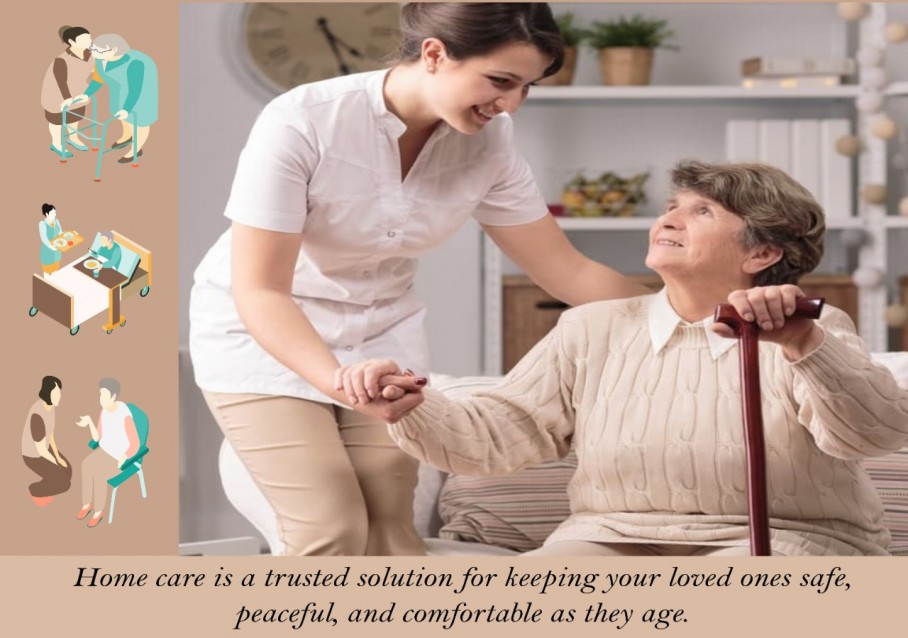
Being self-reliant is the supreme goal of a senior citizen. The ability to undertake work and perform it autonomously without the aid of others gives them satisfaction as if they had accomplished something exceptional. The major drawback of being self-reliant is that they hinder people from helping them. At some point in life, everyone needs a helping hand -that is the scenario where domiciliary care or home care knocks at the door.
“Loneliness is not being forlorn, it is the perception that nobody cares.” It is said that, majority of the senior citizens who live a secluded life experience a lack of companionship. Which sequentially leads to depression and other psychological and behavioral disorders. Bereaved states, deteriorating health conditions- can sometimes trigger depression. It is essential to discern that depression isn't an inevitable part of aging nor a manifestation of weakness.
Every Problem is like a big door -you only need to find the key and what if the key is right at your doorstep? If healthcare and assistance are all that you need, then you will get it right at your home. A professional caregiver or caretender brings paramedical aid and assistance in day to day life for senior citizens at your doorstep.
WHY IS HOME CARE IMPORTANT IN LOOKING AFTER SENIOR CITIZENS?
While it may be hard to admit, most of the senior citizens will require some sort of assistance after the age of sixty-five. They may be used to managing everything themself, dividing up responsibilities, or relying on household members for trivial aid around the home. But as they grow older their circumstances change, getting around and taking care of themself can become more and more complex. Of course, everyone's needs vary, depending on factors such as how much assistance they have, their general health and mobility, and their financial status. If the thought of moving to a retirement community, assisted living amenity, or nursing home doesn't appeal. Geriatric care or Home-care services may be able to keep you living in your own home for longer.
CHALLENGES FACED IN-HOME CARE WHILE LOOKING AFTER ELDERLY :
Caregiving can be physically and emotionally exhausting, particularly if it is primarily on one person -such as a spouse or a kid.
It is complicated to predict if the senior at home has a chronic pathological condition, which is suspected to worsen over time.
One of the most challenging aspects is bathing and hygiene. Bathing and hygiene aid is not only physically arduous but also emotionally challenging, as elders usually feel embarrassed.
Urinary incontinence/bedwetting is the involuntary leakage of urine most commonly noticed in senior citizens. cleaning them regularly to avoid the potential risk of infection is vital
The risk of accidental fall injuries due to loss of bone density, the decline of nervous coordination, and weak eyesight often lead to lethal slip and trips.
Memory impairment (amnesia) and sensory decline can make it almost impossible for elders to maintain the complex medicine Cycle.
Alzheimer's is a brain disorder that causes difficulties with memory, reasoning, and behavior. Dementia symptoms gradually worsen over several years.
Old age is a delicate phase; Senior citizens need care and comfort to lead a healthy life without worries and anxiety. Maintaining comfort for senior citizens can be challenging, especially for those with multiple ailments. Care providers can dissolve ageist stereotypes and produce decisive outcomes.
Advanced technology has progressed to a position where many services available in the hospital can be administered at home. Home care is less expensive than other modes of care and the most comforting form of health care which makes it notable among the other Health Care professions.
VARIOUS HOME CARE SERVICES :
The services of home care assistance an inmate can experience at home are boundless. Depending on the individual patient's infirmity, care can range from nursing care to specialized medical services.
Doctor Consultations :
A Licensed General Practitioner / Doctor may minister a patient at home to review the health status, recommend the diagnosis, formulate a treatment strategy, and refer them to a specialist if needed.
Nurse consultations :
A Registered Nurse who is licensed to practice nursing can treat wounds, ostomy care, intravenous therapy, administering medication, monitoring the general health of the inmate, pain control, and other health care.
Pharmaceutical services :
Medication and medical devices can be delivered at home. If the patient demands it, training can be provided on how to use the equipment, including intravenous therapy.
Experienced Caretenders :
Home health aides can assist the patient with his or her personal requirements such as getting out of bed, walking, bathing, and dressing. Some care tenders have undergone specialized training to assist with more functional care under the surveillance of a therapist.
When senior citizens have been living in the same house for decades, it can indicate antiquated kitchens, bathrooms, and living spaces. Creating a secure, senior-friendly home involves modifying the house for accessibility, wiring it with smart home technologies, and renewing devices for safety and ease of use.
Today’s aging population is aging differently than just 50-100 years ago and there are more ways to enable people to age in place. Home care is a trusted solution for keeping loved ones safe, peaceful, and comfortable as they age.